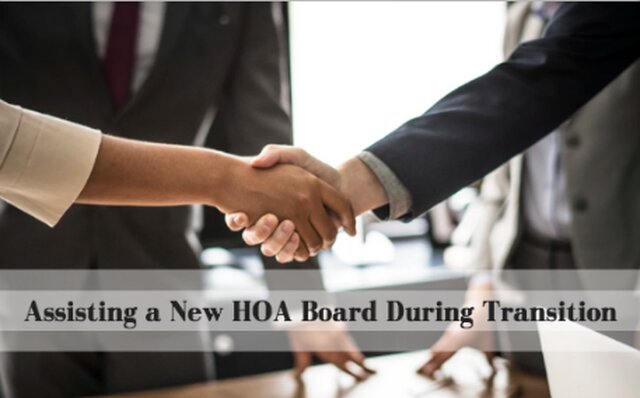Being a board member may be a volunteer position, but a vital one that helps maintain the health, appearance and property values of your community.

Assisting a New HOA Board During Transition
Many homeowners associations having annual meetings in the fall, so the early winter is spent with newly minted directors “getting their feet wet” learning their responsibilities. As members, especially if they have attended meetings already, most directors know a small part of “the drill,” such as posting announcements and holding quarterly board meetings, but the intricacies involve a lot more than what is on the surface in a meeting agenda. This is why it is vital for new directors to obtain as much information from the property manager, current board members, and retiring directors. Previous members of the board of directors will no doubt spend the first quarter of their retirement being besieged by questions from new directors. It, therefore, helps that the retired directors have as much documentation at the ready, as well as to give the newly elected director the property management company’s website URL to be able to view detailed responsibilities of each member of the board.
Documenta Providing Continuity
Along with providing a website URL to learn the basics, incumbent board members who are transitioning out of their positions on the board should compile, during their tenures, a digital (if possible) folder of documents and correspondences over their tenure with regard to contracts with vendors, a list of preferred vendors, invoices, minutes and meeting agendas, and other letters and emails between members and directors or members and the property manager having to do with complaints, fees and/or maintenance issues. Executive session documentation is confidential and should be kept between the directors and property management. Don’t forget the most basic source of information and community structure: the community CC&Rs. These are vital for learning how to govern the HOA, from assessments to fees, reserves, board meetings, agendas, and elections.
Financial and Security Information
Those who are transitioning into the role of board treasurer should discuss financials and receive a copy of at least 2-3 years of the association’s budget from either the outgoing treasurer or the property manager. If the HOA has low reserves, the beginning of the new directors’ term is a good time to learn why funding is lacking, and what is being done to address it. It’s a good idea for a property management accounting employee with bank documents to attend the HOA annual meeting so that new directors can become signatories and bills remain paid in a timely manner. Be sure to also obtain the latest reserve study. In general, depending on your governing documents or state, reserve studies are conducted yearly or every other year.
If there are any keys to secure areas such as phone wiring boxes, security systems, gates, pool houses, or fire extinguisher boxes, they should be turned over to the new director(s). New directors should also download cell phone apps with access to security system camera if applicable.
Basic Information: Neighbors and Vendors
As a director, it’s important to keep the lines of communication open with your fellow members, hence one of the first bits of information to obtain is a complete list of homeowners (and renters) in your community. Absentee landlords should be able to share renter names and phone numbers with renter permission. In case of emergencies or other issues that may cause inconvenience, it’s important to have both phone numbers AND email addresses. If, for example, your parking lot security gate will undergo maintenance between specific hours, it’s important to get the word out so that residents can park their vehicles elsewhere. Likewise, if a sewer issue requires immediate attention and residents’ water must be turned off temporarily. The more informed directors are regarding projects and how they affect the members of the community, the more effective they will be at their jobs.
Property managers will usually have a comprehensive list of preferred vendors for their communities: plumbers, electricians, handymen, security specialists, and landscapers. In addition, they should have a list of contacts at City Hall when assistance is needed with permitting, trash disposal, tree removal or other items requiring city approvals or permits. In the event of after-hours emergency when immediate help is needed, 24-hour vendor information is extremely important to have at hand.
Seek Educational Sources
Directors – in fact, most homeowners – are extremely busy people, and as such can’t always be present to assist fledgling board members with questions. With this in mind, there are many alternatives. First, property managers are invaluable sources of information. They will possess a broad knowledge of your property’s history and how various issues are handled. They may also have seminars or webinars available for new directors. They should also be able to provide new directors with outside source material on other websites, such as for the state, or other informational sites specific to the state that contains statutes and advisories on how to implement those statutes.
Being a board member is work that carries with it serious fiduciary responsibilities, so while the becoming a director offers an excellent opportunity to get to know your neighbors and community better, it ultimately means diplomacy and sobriety are necessary. The job may be a volunteer position, but a vital one that helps maintain the health, appearance and property values of your community. As a new member, you’ll appreciate the time and effort other directors put into making your living space a better place.
